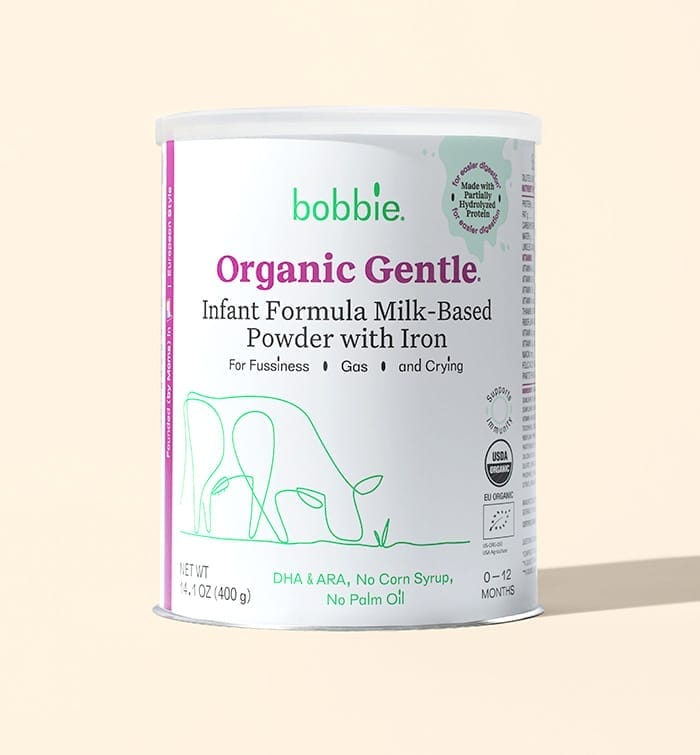We are proud to say that these posts are not sponsored. Our editorial team of Bobbie moms and writers personally select each featured product. If you buy something through our links, we may earn an affiliate commission, at no cost to you.
One of the first big decisions you have to make as a new parent (besides choosing a name!) is deciding what you will feed your baby. If you ask a formula feeding parent about the most challenging part of feeding their baby, they’re likely to say digestion issues. Not surprisingly, if you ask many breastfeeding families— they’re likely to say the same thing!
Many first, second, and third time parents resort to desperate late night Google searches ranging from “baby constipation remedies” to “how to stop baby hiccups” to “the best baby formula for gas or colic.” It’s easy as new parents to panic when your baby seems uncomfortable— we get it! (We’ve been there!) But before you go through the stressful process of changing what you’re feeding your baby, let’s talk about common baby tummy issues and their solutions— which are often simpler than switching formulas!
- Are Newborn Upset Stomachs Normal?
- 5 reasons why babies have tummy troubles
- Common Infant Digestion Issues
- Common Symptoms & Possible Solutions for Baby Tummy Issues
- Troubleshooting Gas
- Troubleshooting Reflux
- Troubleshooting Constipation
- Troubleshooting Hiccups
- Troubleshooting Colic
- Tummy Symptoms that Need Further Attention
- Baby Tummy Issues
Are Newborn Upset Stomachs Normal?
First thing’s first – ALL babies have digestive symptoms. It’s easy to fall into the trap of thinking that your baby’s upset stomach are being caused by the formula they are eating. Often, new parents see digestive symptoms like gas, spitting up, infrequent stools, or hiccups and will make panicked changes to their baby’s formula. Before switching formulas, It’s important to know that all babies, regardless of how they are fed (formula, breastmilk, bottle, or at the breast) will have some digestive symptoms, and typically it is not a result of what they are eating, but a multitude of other factors. There are many strategies to try prior to switching formulas! Wondering why infants have stomach problems?
5 reasons why babies have tummy troubles
Infants’ digestive systems are NEW
Babies spend 9-10 months being fed through the umbilical cord. While their digestive systems are obviously present when born, they take time to “warm up” before they work efficiently. This results in common digestive symptoms.
Infants have weak esophageal sphincters
You know that little “flap” that keeps the stuff in your stomach from coming back up? That muscle is underdeveloped in infants which is why nearly all infants spit-up (especially between 2-4 months).
Infants may not produce enough digestive enzymes
Another organ that’s immature in newborns is the pancreas. This means that most infants will have some level of maldigestion due to lack of adequate digestive enzyme production.
Babies are still learning how to feed well
Babies may have symptoms because they’re not taking in milk efficiently or effectively. Gulping, clicking, gagging or coughing can all cause digestive issues as babies learn to eat by mouth.
Babies are sensitive to change
Newborns are going from a controlled environment into our big, noisy, bright world! They can easily become overwhelmed and overstimulated by frequent changes. Changing formulas too often or adding in too many variables often makes digestive symptoms worse, not better.
Common Infant Digestion Issues
Baby Gas
Nearly all babies struggle with gas at times, both as a result of the immature digestive system and from taking in air while feeding. Most infants grow out of gas-related discomfort by 3-4 months.
Baby Spit-Up
Spit-up peaks between 2-4 months as babies start to eat more and begin rolling. If your baby is a “happy spitter,” aka spitting up constantly but doesn’t seem to be bothered and is gaining weight appropriately, it’s typically fine (though frustrating)!
Baby’s Infrequent Stooling
It can be totally normal for babies to poop multiple times a day or to go up to a week without pooping. Infrequency does not always mean constipation which is defined by infrequency plus hard, pellet-like stools.
Infant Hiccups
Hiccups are very common and are nearly always harmless. Even so, they can cause distress for baby and parent! As babies get older, hiccuping will decrease (but not fully resolve, as we adults know).
8 Tips to Ease Baby Tummy Issues & Gas
Before sharing strategies to address these symptoms, remember, one of the BEST STRATEGIES is paced bottle feeding. Paced feeding allows baby to control the flow of milk or formula from the bottle, and reduces the likelihood (or severity) of many tummy issues.
- Feed upright: We sit upright when eating, so why shouldn’t baby? Keeping baby upright while bottle feeding (as in paced bottle feeding) allows them to control the flow of the milk or formula and prevents them from ‘gulping’ in air.
- Burp regularly: Burping frequently throughout the feeding allows baby to expel any air that they have taken in and can help prevent some spitting up and tummy discomfort. Having trouble getting baby to burp? For more on this, check out this post on babies that won’t burp!
- Use an anti-gas/anti-colic bottle: These best baby bottles are designed to help reduce air intake during bottle feedings.
- Gas drops: The active ingredient in gas drops is simethicone, an ingredient that breaks up gas bubbles in the stomach. This makes gas easier to pass and reduces gas discomfort for baby.
- Gripe water: Gripe Water is an herbal supplement that offers relief to babies who suffer from gas, colic, hiccups, or general fussiness. Gripe water helps to settle the stomach by relieving gas buildup.
- Probiotic supplement: The good bacteria in baby probiotics supports the growth of healthy gut flora that break down food. The more easily your baby’s digestive system can break down food, the less gas it creates.
- Infant massage/bicycle legs: Gentle massage on an infant’s tummy helps to encourage trapped air to move through the intestines and can relieve gas pain and discomfort.
- Ensure appropriate latch and oral-motor function (no ties, clicking, gulping): Oral-motor difficulties or oral ties, like a lip tie, can prevent baby from forming a secure latch on to the bottle. Babies with these difficulties tend to swallow a lot of air, which can contribute to increased gas, fussiness, spit-up, and reflux symptoms. Consult with your care team if you are concerned about oral-motor function!
Common Symptoms & Possible Solutions for Baby Tummy Issues
Troubleshooting Gas
- Feed baby while upright and burp regularly
- Use an anti-gas or anti-colic bottle (Dr Brown’s Anti-Colic Bottles are a favorite!)
- Add a high-quality infant safe probiotic to baby’s diet
- Try gas drops or gripe water if your pediatrician approves
- Do infant exercises like bicycle legs or tummy massages
Troubleshooting Reflux
- Stop the feeding frequently to burp
- Keep baby upright for at least 15 minutes after each feeding
- Stir formula (or use a formula pitcher) to mix powder formula instead of shaking! Shaking causes air bubbles and more air = more spit-up (Dr Brown’s Baby Formula Pitcher for the win)
- Discuss with your doctor whether a thickened formula (“anti-reflux”, “AR”, or “added rice starch” options) or a specialty thickener like Gelmix makes sense to try
Troubleshooting Constipation
- Discern whether it’s true constipation or just infrequency!
- Add a high-quality probiotic to baby’s diet
- Offer gripe water – increased hydration can soften stools
- Provide rectal stimulation as needed (i.e. the tip of a baby thermometer with Vaseline)
- Discuss with you doctor whether a formula with hydrolyzed (broken-down) proteins could be a good fit

Shop Bobbie Organic Gentle Infant Formula
Bobbie Organic Gentle is the only baby formula in the U.S. market that offers 100% partially-hydrolyzed whey protein and 100% lactose as the carbohydrate source. Our gentle baby formula is easy on sensitive tummies to help alleviate fussiness and gas. Learn more about Bobbie Gentle.
Troubleshooting Hiccups
- Make sure baby isn’t gulping during feedings
- Offer frequent breaks to burp
- Try gripe water. It includes a blend of soothing herbs that may help
- Change baby’s position during the feeding
- Offer distraction (but don’t scare or startle baby!)
Troubleshooting Colic
- First, know that colic does not necessarily mean there’s a “problem” that needs to be fixed – you didn’t do anything wrong!
- Introduce a high-quality probiotic
- Try gripe water if approved by your pediatrician
- Ensure baby is not overtired
- Rule out potential causes of discomfort like silent reflux or cow milk protein allergy
- Keep baby moving, get outside, and do anything and everything that seems to help!
Tummy Symptoms that Need Further Attention
While most digestive symptoms are common and can be helped (but not eliminated) using the strategies provided, some symptoms are not normal, and require medical advice. If your baby is experiencing any of the following while feeding or after feeding, please schedule an evaluation with your child’s doctor:
- Projectile vomiting
- Pervasive, widespread rash
- Blood or mucus in stool
- Hard, pellet-like poops
- Gagging, choking, or clicking
- Extreme discomfort

Shop Bobbie Organic Gentle Infant Formula
Bobbie Organic Gentle is the only baby formula in the U.S. market that offers 100% partially-hydrolyzed whey protein and 100% lactose as the carbohydrate source. Our gentle baby formula is easy on sensitive tummies to help alleviate fussiness and gas. Learn more about Bobbie Gentle.
Baby Tummy Issues
Many parents are relieved to discover that their baby’s digestive symptoms are totally normal and are to be expected. An infant’s digestive system is brand new and takes some time to mature— no matter what baby is eating! Typically these digestive symptoms are minor and can be managed with easy changes, including paced feeding, adding a high quality probiotic, or implementing tummy massage. Others, like ‘happy spitting’ and hiccups, will reduce over time or resolve on their own as baby continues to grow and their digestive system matures. Even so, there are times when a baby formula switch or other action is warranted– if you have any questions or concerns about your baby’s specific digestive symptoms, reach out to your pediatrician or care team for support.

